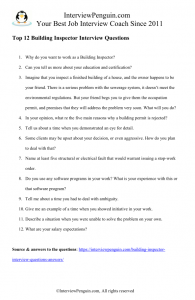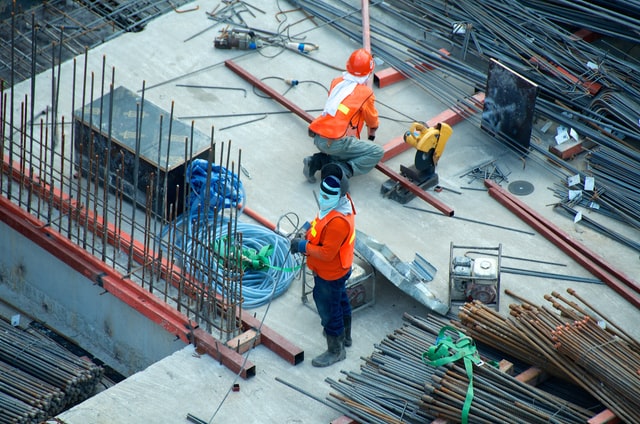Gone are the days when you simply found a clearing in the jungle, or made one with a machete, and started to build your new house. Today, first and foremost you need a lot of money to buy basically any land. And when you finally get a mortgage and feel ready to build, you need to deal with the bureaucratic apparatus, and get several permits, before you can dig your spade into the ground for the first time.
But a disadvantage for someone is always and advantage for somebody else. Working as a Building Inspector, you will be the one who will issue construction and occupation permits, earning big money while doing so. You will conduct land surveys, inspect the buildings in different phases of construction, and at the end give a green light or a red one, if some building does not adhere to the safety, structural, and building code regulations.
Let’s have a look at some questions you may face while interviewing for this interesting occupation.
Table of Contents
Why do you want to work as a Building Inspector?
Because you are looking for big bribes from desperate guys, who want to build their new mansion in a place that does not legally allow someone to build such a mansion. Because you know that the official salary building inspectors get is just the fraction of money they really make, mostly from “donations”. Or because you do not really have to do much in this job–if you do not want to, and money will come nonetheless.
Maybe these are your reasons–nothing wrong with that in my book–everyone makes their own choices. As you can imagine, however, you should not refer to money, and especially not to bribing, when explaining your career choice in an interview.
Try to focus on the meaningful purpose of the job, and skills and abilities that make from you a good candidate. You are aware that construction work will never stop. Everybody prefers to live in their own house, and someone has to make sure that the house won’t fall on their head, or the head of their neighbors.
What’s more, you have strong moral principles, education in the field, your attention to detail stands out. Simply you feel ready to handle the job, and everything that belongs to it.
Can you tell us more about your education and certification?
If you do not have a building inspector certification or license yet, ensure them that you plan to get one, as soon as you have enough on the job experience, required by the authorities in your country or state. That’s the reason why you apply with them in the first place. But you want to get a certification, and continue working on your education in the field.
You can also talk about your college studies, explaining how various courses and subjects prepared you for the role of a building inspector. The most important thing is to show confidence. Regardless of your education and experience, you feel that you will handle the job–under the guidance of a more experienced colleague first, and then on your own, once you get the certification.
Imagine that you inspect a finished building of a house, and the owner happens to be your friend. There is a serious problem with the sewerage system, it doesn’t meet the environmental regulations. But your friend begs you to give them the occupation permit, and promises that they will address the problem very soon. What will you do?
There’s no place for emotions in a job of a building inspector. Ensure the hiring managers that first and foremost, you would try to assign another inspector to the house–if you knew that it belonged to one of your friends. At least you should claim so in an interview.
Inspecting it, you will do your regular check, and if the sewerage system doesn’t meet the regulations, you will simply specify the remedy they have to do, and won’t issue the permit. And it doesn’t matter if the owner is your best friend, or if the remedy is expensive, and it will take a long time to get it done.
Friend or enemy, rich or poor, man or woman–you will always stick to the rules, do your inspection, and give the permit only to people who meet safety, structural, and building code regulations with their building.
In your opinion, what re the five main reasons why a building permit is rejected?
This depends on your place of application, and also the types of building you will work with. But you can refer to some of the following reasons, just to show your interviewers that you know your job:
- Missing evaluation report for some products that were used during the construction.
- The basement wall design isn’t in accordance with the soil classification found on the building site.
- There are no separate framing plans for floor ceiling, and roof.
- Location of smoke detectors isn’t shown on the building plan.
- No emergency openings from the bedrooms and basements.
Tell us about a time when you demonstrated an eye for detail.
Ability to spot minor discrepancies and defects distinguishes an excellent building inspector from the rest of the crowd. And you should convince them that you have this ability.
Obviously the best answer is the one related to your evaluation of the buildings. Maybe you spotted something others overlooked, something small but important, and this was the reason why you could not issue the permit (or suggested your superior to nor issue it).
If this is your first job application, however, you can refer to an example from school, or even to something from your personal life. Try to talk with enthusiasm about the case when you discovered something other missed to spot. Hiring mangers should get an impression that you enjoy digging deep into the details of each construction site and building, and won’t hand out permits easily… They may also test you with some other attention to detail interview questions, so make sure to get ready for them.
* Special Tip: You can download all questions in a one page long PDF, and practice your interview answers anytime later, even when offline:

Some clients may be upset about your decision, or even aggressive. How do you plan to deal with that?
Ensure the interviewers that you do not care about the emotions of the clients. Of course everyone wants to get a green light for their project, or to get a permit without any further obstructions. But you are a building instructor, and not a psychologist, or their best friend.
You are aware of the responsibility you carry on your shoulders. Hence you will simply listen to their bad words, or their cries, but it won’t move you an inch. You won’t change your decision or report just because someone is upset. This is a profession, and you are not in to make friends. You are in to make qualified and responsible decision for the entire society.
Other questions you may face in your building inspector job interview
- Name at least five structural or electrical fault that would warrant issuing a stop-work order.
- Do you use any software programs in your work? What is your experience with this or that software program?
- Tell me about a time you had to deal with ambiguity.
- Give me an example of a time when you showed initiative in your work.
- Describe a situation when you were unable to solve the problem on your own.
- What are your salary expectations?
Conclusion, next steps
Interview for a job of a building inspector belongs to interviews with average difficulty. This is not a fancy job title, and you won’t typically compete with many other applicants. It’s always easier to succeed when ten other young and hungry from engineering or architecture do not compete with you for the position.
On the other hand, you may have to deal with some tough behavioral and technical questions, just like I showed you in the article. Try to polish your knowledge of regulations and rules for the given building segment, and do not forget to show some enthusiasm and positive body language in your interview. I hope you will make it, and sign a new job contract. Good luck!
May also interest you:
- Surveyor interview questions – Certain questions may overlap with the questions for building inspector interview. Learn how to deal with them.
- Estimator interview questions.
- 15 most common interview questions – What are your weaknesses? What motivates you the most? Where do you see yourself in five years from now? Learn how to answer questions that you can deal with in virtually any job interview.

